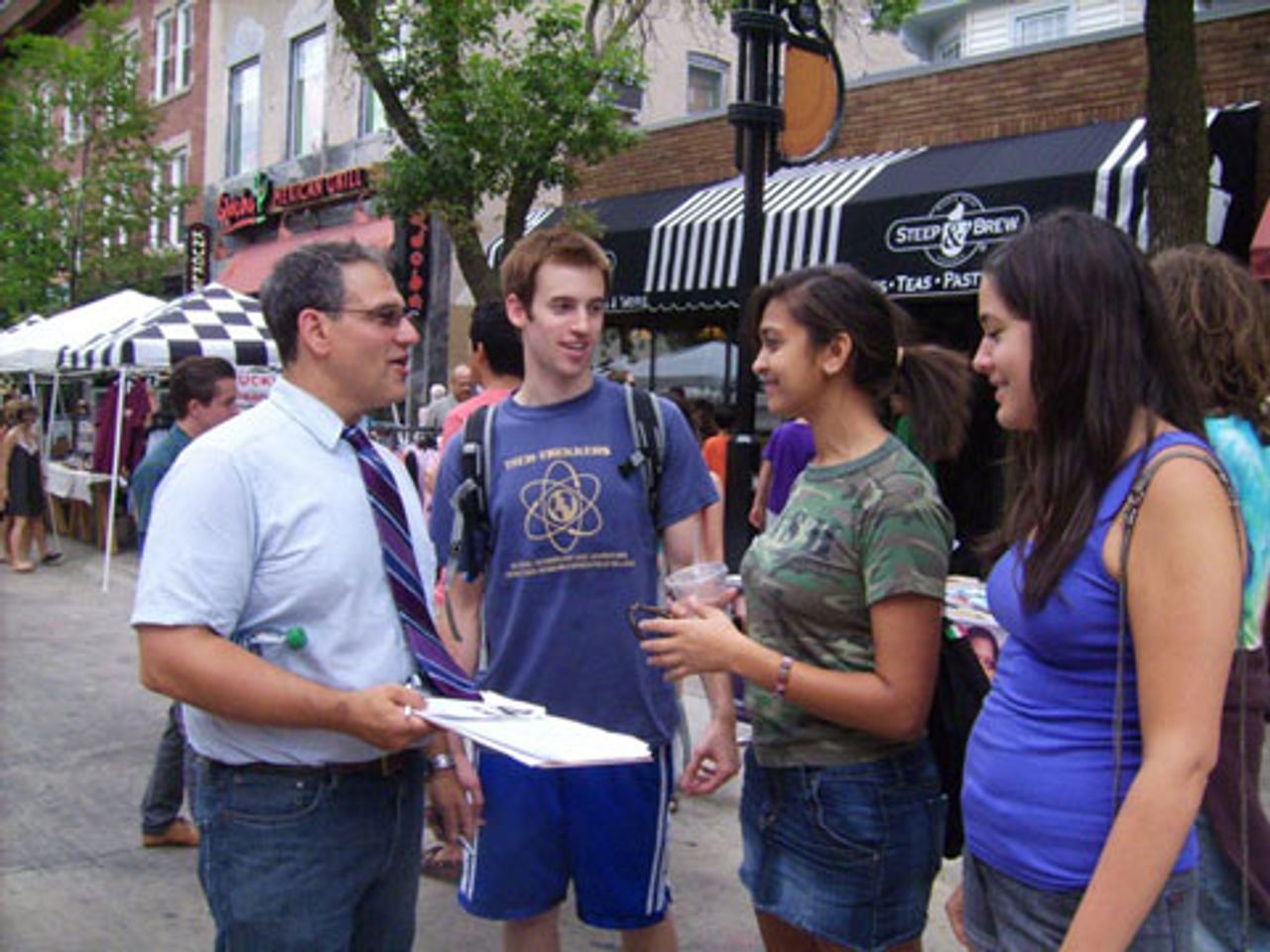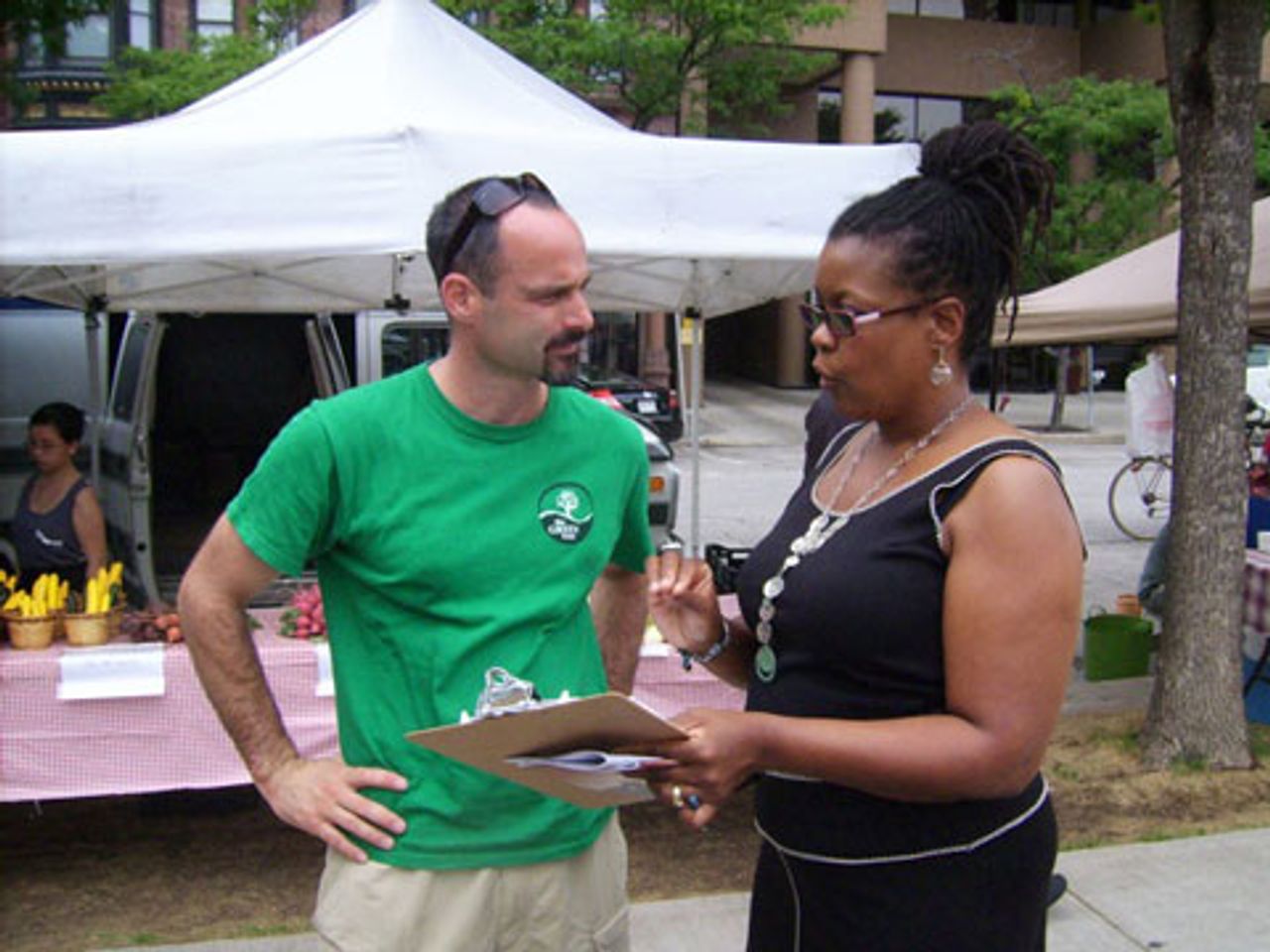The Socialist Equality Party kicked off its campaign in Wisconsin this weekend, as presidential candidate Jerry White and vice presidential candidate Phyllis Scherrer visited Milwaukee and Madison.
 Jerry White in Madison
Jerry White in MadisonWhite, Scherrer and an SEP campaign team are collecting signatures in order to gain ballot-access in Wisconsin. The Secretary of State requires 2,000 valid signatures for candidates to qualify for the November 6 general election.
On Saturday morning, White and Scherrer campaigned at two farmers markets in Milwaukee, a city of 600,000 hit hard by plant closings and social spending cuts. The candidates and campaigners spent the day speaking with workers and youth about the 2012 elections and the need for a socialist alternative to Obama and Romney and their policies of austerity, wage-cutting and war.
Traina, a young factory worker at Pace Industries in Grafton, voiced her frustration with the rising cost of living. “It’s hard to raise a family. Lots of people are just grateful to have a job right now.”
White explained that both big business parties were seeking to drive down the living standards of workers to boost the profits of American capitalism. “Obama is cutting wages so much that he’s boasting about corporations shutting operations in Mexico and China and moving to the US for cheap labor. What does this mean for the working class? For example, when Obama restructured General Motors, he slashed worker wages to $15 an hour.”
Traina agreed, noting that workers at her plant started a $10 an hour.
Patrick, a librarian in Milwaukee, explained that budget cuts have hit the area’s libraries especially hard. “They’ve been cutting staff, we’ve lowered hours, and we’re doing more with less.”
Patrick supported last year’s mobilization of hundreds of thousands of workers in the state capitol, Madison, against Republican Governor Scott Walker’s proposed “Budget Repair Bill”. The bill stripped public employees of workplace rights and paved the way for more $1.2 billion in budget cuts, including $800 million from the public schools.
Though workers and young people were engaged in a bitter month-long battle, the Democrats and the unions sabotaged the movement and channeled it into the dead end of a campaign to recall Walker and elect a Democratic governor.
In the recall election the Democrats put forward a right wing, pro-business candidate, former Milwaukee Mayor Tom Barrett. Barrett himself had used Walker’s anti-union legislation to slash wages for city workers in Milwaukee.
“There was all this energy, and then there was confusion,” said Patrick. “There was a lack of leadership.”
White agreed, and elaborated on the role of the Democrats in suffocating the Madison protests. “From the beginning,” said White, “the Democrats said that they agreed with the cuts. The Democrats are carrying out cuts in Illinois, New York, and California, for example. They only protested the tactics of the Republicans, because the Democrats prefer to use the unions to impose cuts on workers. The recall was a deliberate effort to crush the mass protests and prevent it from sparking a national movement against austerity.”
Tiffany, a college student studying to become a medical specialist, also spoke with White. She expressed her dissatisfaction with the Obama presidency. “I don’t like [the Obama Administration]. At first, I was OK with a black president. But we’re still getting our money taken away from us.”
White replied by explaining that the real social dividing line is not race, but class. “They try to fool us with racial politics, but class is the main issue.”
Tiffany strongly agreed. “It’s not right that they do that.”
After campaigning at various cultural festivals in Milwaukee on Saturday afternoon, a group of campaigners traveled to the state capital of Madison on Sunday morning.
In Madison, the scene of the mass protests, the SEP spoke with hundreds of people, including teachers, state employees, and University of Wisconsin students, who face tuition hikes this year as a result of the budget bill. Many expressed confusion as to how the protests, which drew mass support, dissipated so quickly.
Campaigners explained the pernicious role of the trade unions in rejecting worker demands for a general strike and made clear that only an independent movement of the working class—that opposed the capitalist system—could guarantee the social and democratic rights of workers and young people.
 Phyllis Scherrer in Milwaukee
Phyllis Scherrer in MilwaukeeAnother campaign team continued its work in Milwaukee on Sunday. Phyllis Scherrer spoke to Jason, a young worker, about the history of socialism in the United States.
Milwaukee’s local government was largely influenced and mostly run by politicians from the Socialist Party of America for several decades in the early to mid-1900s. Socialist Mayors served from 1910 to 1960, with a brief period of Democratic Party control between 1940 and 1942. Though the influence of the Socialist Party led to moderate improvements in local infrastructure, the strengthening of some social services, and the expansion of local parks, the Socialist Party was a thoroughly reformist organization that did nothing to challenge capitalism or American imperialism.
Jason said that he comes from a family of socialists, but had not been very political himself. Scherrer explained that the abolition of the dictatorship of the banks required a movement led by the working class.
One older IT worker said, “My grandfather was a socialist and a member of the American Railway Union, the one started by [Eugene V.] Debs.” He also explained that he was reading a book about the Moscow Trials and had read about Trotsky.
Over the weekend, SEP campaigners collected hundreds of signatures, sold literature, including a new SEP pamphlet on the lessons of Wisconsin, and raised donations for the election campaign. The SEP will continue to campaign in Wisconsin and calls upon all workers and young people to support our efforts to gain ballot access in Wisconsin and other states.
To become involved in the SEP campaign, including the Wisconsin ballot effort, visit socialequality.com.
